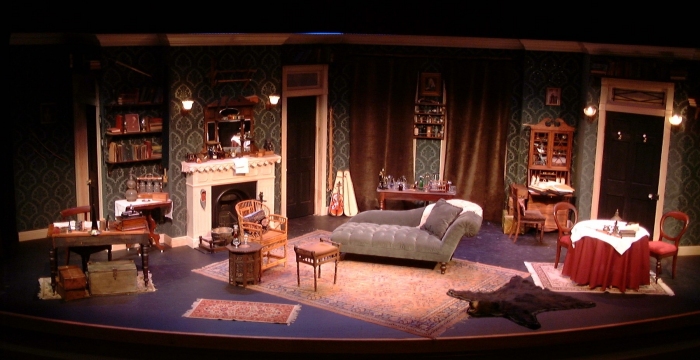
The title says it all: the cast is just these two men, these men we all think we know. And all the action takes place in one room, one world-famous sitting-room.
Doctor Watson has been grieving the death of Sherlock Holmes for three years when Holmes suddenly returns to Baker Street, expecting a warm welcome from Watson. But the reunion is not a happy one: Watson is furious at Holmes for his deception — and to make matters worse, a trained assassin now waits outside the Baker Street flat, ready to kill Holmes … or Watson … or both … at any moment…
After performing to sold-out standing-room-only houses off-Broadway in 1990, the script has been produced by small theatre groups across the country — and is available in an attractive edition available from Amazon.com. The book contains the most polished revision of the script plus photos, tips on production, and more.
If you’re playing Watson you have just as many fun things to do — in many ways it’s more of a play about him than about Holmes — plus you get to choke Sherlock with your bare hands, something many Watsons have longed to do.
Buy the script on Amazon.com — Contact me directly for performance rights!
“I have read HOLMES & WATSON and it held me riveted from first page to last. It dealt with the interrelationship of Holmes and Watson more deeply than Doyle ever bothered and gives Watson an absolutely fair shake — and has a mystery, too. Bravo!”
–Isaac Asimov
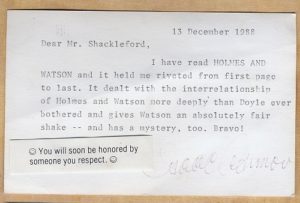

“Bravo! Fine play. We seem to share much, you and I …”
–Jeremy Brett
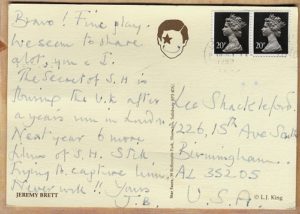

“This play has smarts and guts and grins … Shackleford’s dialogue is clever and convincing, decorated with smart retorts and sly innuendo…”
—Birmingham News

“When I first read an earlier version of the script, I picked it up with great trepidation. It was very good. When I saw a later version of it performed, I was pleased to be able to tell Lee in visceral honesty that it was great. Now comes a book version of the script that is as beautiful as the play is good. The production of the book is elegant, with wonderful photos of various performances of the play.”
—Andrew Solberg, BSI

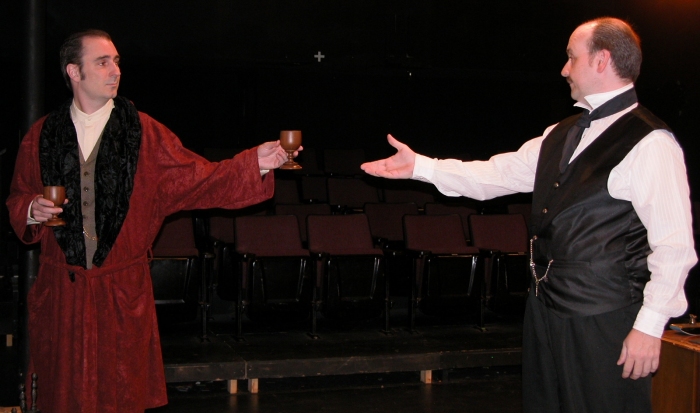
There’s a lot of smoking and drinking and shooting in this play.
I’ve often thought the play’s subtitle should be
“Alcohol, Tobacco, and Firearms!”
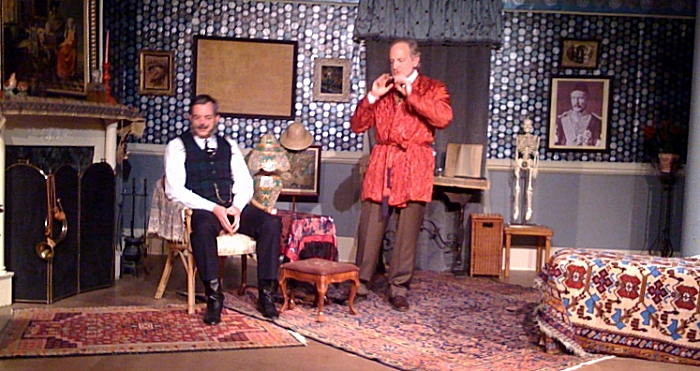
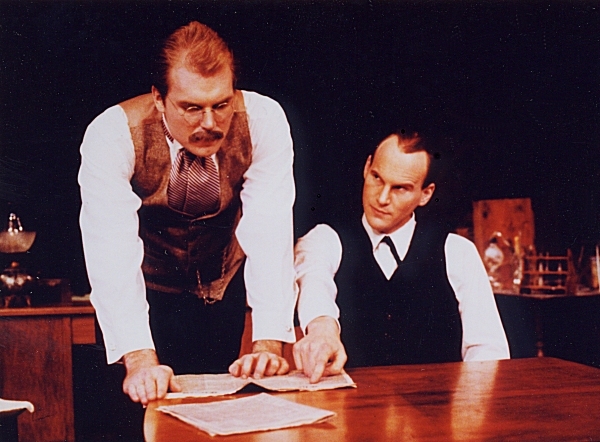
HOLMES
I’ve noticed you’ve never bothered to tell the story of my final battle with Professor Moriarty. And I’ve noticed our stalwart London newspapers never ran my obituary.
WATSON
Through no fault of mine. You should know I spent many a day campaigning for your demise to be given the proper attention. But always the answer came back, “When you present us with a body, Dr. Watson, we will pronounce the poor fellow dead.” Until that time you were considered merely missing.
HOLMES
Rubbish. You said there was general mourning throughout the city.
WATSON
Oh, there were many who grieved, certainly. In the spring of 1891 I could not walk a mile in the heart of the city without meeting someone wearing a black armband, eager to give me his condolences.
HOLMES
Well, that is gratifying at least.
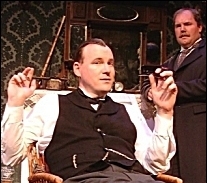
WATSON
But not official. And I must say, there were many more who had not heard of your passing, and when they did …
HOLMES
Yes?
WATSON
Surely you must know that throughout your career you have left a trail of admirers behind you wherever you went. Admirers — but not friends.
HOLMES
And what of it? There are precious few human beings whose company I do not find positively loathsome. I have never made any attempt to conceal that fact.
WATSON
My point exactly.
HOLMES
I am compelled to agree with the great satirist Jonathan Swift, who observed that mankind is “the most pernicious race of little odious vermin that Nature ever suffered to crawl upon the surface of the earth.” It was not my business to make friends with people I dislike. It was my business to solve their idiotic problems for them. It was my business to stanch the rising tide of criminal activity in a city to which the refuse of society seem drawn as carrion crows to a rotting carcass.
WATSON
I’m sure you are aware, then, that criminal activity in London is a good deal worse than three years ago.
HOLMES
And I am somehow to blame for this?
WATSON
You did say your reason for pretending to be dead was so the criminal underworld would grow careless, allowing their easy capture by the police.
HOLMES
You should not be surprised that our police have bungled yet another opportunity —
WATSON
But if you had no confidence in the police, how could you believe there was a purpose to be served in —
HOLMES
Watson, must we continue on this tiresome subject? I grow immensely weary of this — and indeed of everything else.
WATSON
Aftereffect of the cocaine.
HOLMES
I am well aware of the aftereffects of cocaine.
WATSON
I was merely reminding you that I warned you earlier.
HOLMES
Yes, your thoughtfulness is appreciated. Now for God’s sake, let’s change the subject. Why don’t you read me one of the poems you bragged about earlier.
WATSON
I wasn’t boasting, I was responding to —
HOLMES
Oh, never apologize for your own work, Watson, not if you are to shine as an artist. There is little enough solace in creativity without having to be sorry for what one does. I have been able to reconcile much of my work with my conscience only because I have ignored the consequences of some of my actions. It has always been this way with intelligent, creative people, and will always be the same. This is why I resolved, long ago, never to apologize for anything. Nothing is worse than having to be sorry about one’s work. Nothing!
WATSON
That’s a very cynical attitude, Holmes.
HOLMES
It is a fact. I can see that the Creator Himself must have surely been in a black mood when He looked down upon the wicked people of Noah’s time and was forced to repent that He had created them at all.
WATSON
I have noticed an alarming habit you have of comparing yourself with the Almighty. I have often wondered about that. I think it betrays some aspect of your character.
HOLMES
Don’t be vulgar, Watson. The comparison is by no means absolute.


